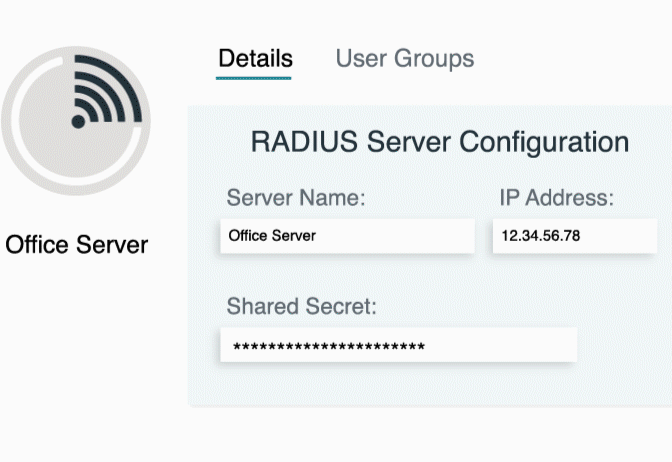RADIUS authentication has been around for decades, but IT professionals still debate whether it should be the go-to service for managing and authenticating users. Although, over time, the technology landscape has developed to include a variety of authentication protocols, RADIUS authentication continues to offer significant value in modern IT environments.
As such, we’ve broken down exactly what RADIUS authentication is, as well as the pros and cons of RADIUS that IT admins should evaluate with respect to its implementation.
What is RADIUS Authentication?
At its most basic, RADIUS authentication is an acronym that stands for Remote Authentication Dial in User Service. Livingston Enterprises, Inc. developed it as an authentication and accounting protocol in response to Merit Network’s 1991 call for a creative way to manage dial-in access to various Points-Of-Presence (POPs) across its network.
RADIUS utilizes the client/server model to authenticate and authorize users to login to a network or network infrastructure gear. It works by sending client requests for access to the RADIUS server for verification. These requests are formatted like a package, including the client’s username, password, IP address, and port, which are then queried in the database for potential matches. Depending on the information received, and whether it is correct, the server will return with an action to either accept, reject, or challenge access to the requested service.
Although it was initially developed to replace proprietary dial-in services, RADIUS provides centralized Authentication, Authorization, and Accounting (AAA) management for users who connect to and use a particular network. Over time, this concept has been expanded to include a variety of protocols and modern networks. Traditional AAA management still exists on-prem, but more recently, cloud-based RADIUS authentication has risen in popularity and become the choice solution for many modern organizations.
The Pros and Cons of RADIUS Authentication
RADIUS authentication comes with both pros and cons that vary depending on your specific situation and implementation. To make the best decision for your organization, use this list to decide whether the pros outweigh the cons and come up with a solution that best suits you.
The Pros of RADIUS
- Added security benefits: RADIUS allows for unique credentials for each user, which lessens the threat of hackers infiltrating a network (e.g. WiFi) since there is no unified password shared among a number of people.
- Avoids the pain of password management: Unique credentials ensure that a shared password does not need routine changing, because each person manages their own. This saves time for an IT admin, and users do not have to routinely seek out an updated password.
- Central point for user and system authentication: Through this, IT admins have one point of contact for user management when it comes to authentication, authorization, and password management.
- Great tool for larger networks managed by multiple IT admins: RADIUS makes it easier to control who or what has access, and when. When it comes to hundreds or thousands of users in large corporations, only the correct, authorized people have access to a network of sensitive information. VLAN monitoring via segmented attributes is a critical feature of RADIUS-driven networks.
- Enables 802.1x, which uniquely encrypts user sessions: 802.1x uses the Extensible Authentication Protocol (EAP) framework for moving authentication packets between two components. EAP is extremely flexible, making it easy to add into your existing infrastructure.
- Secure VPN authentication: If you’re comparing RADIUS vs. VPN, RADIUS authentication not only securely connects users to WiFi networks, but it also works with VPNs. This flexibility allows any user to connect to a network easily and securely.
- Easy activation/deactivation: Hosted cloud-based RADIUS, specifically, is easy to use, because the RADIUS servers are managed by a third-party provider. IT admins simply point their networking infrastructure (e.g. VPNs, WiFi access points, etc.) to the cloud RADIUS endpoints for authentication.
- Easily integrates with your current system: Modern RADIUS solutions like this also integrate with any IT system that you currently have in place. This flexibility means that you can utilize cloud RADIUS on top of the other infrastructure that you already have set up, and you can enjoy the benefits with none of the traditional setup.
The Cons of RADIUS
- Traditionally implemented on-prem: Maintenance can be difficult and time-consuming for on-prem hardware. Regular upkeep and monitoring mean that, over time, the management of on-prem servers can be more intensive and frustrating.
- Initial setup for a non-hosted RADIUS server: This can also be difficult for IT admins to implement and integrate in an existing IT landscape, especially if the organization already supports on-prem, legacy services like Active Directory.
- Security vulnerabilities if not implemented correctly: Like any other technology, RADIUS authentication can create new security threats to your organization if it’s implemented incorrectly. Luckily, by using a hosted RADIUS option, the bulk of the setup is done for you, which gives you less to worry about.
- Vast array of configuration options: On RADIUS servers, configuration and initial setup can be complicated and daunting with a wide range of protocols and compatibility issues. Even the most experienced IT admins have to walk through a complex configuration process.
When it comes to RADIUS server software and implementation models, it can be hard to know which is right for you. Some options can be costly and require long-term commitments, while others are free, and some require extensive time and effort to implement. The flood of information can be overwhelming and make it hard to choose the right service for you.
Modern RADIUS Authentication
Although the traditional authentication service has its perks, cloud-based RADIUS authentication provides all the benefits without the hassle of maintaining on-prem infrastructure for on-prem RADIUS authentication. Today, one of the best RADIUS solutions is RADIUS in the cloud. JumpCloud’s Cloud RADIUS feature provides additional security, like password complexity, MFA, and dynamic VLAN assignment, without complicated configuration or the stress of initial setup.




